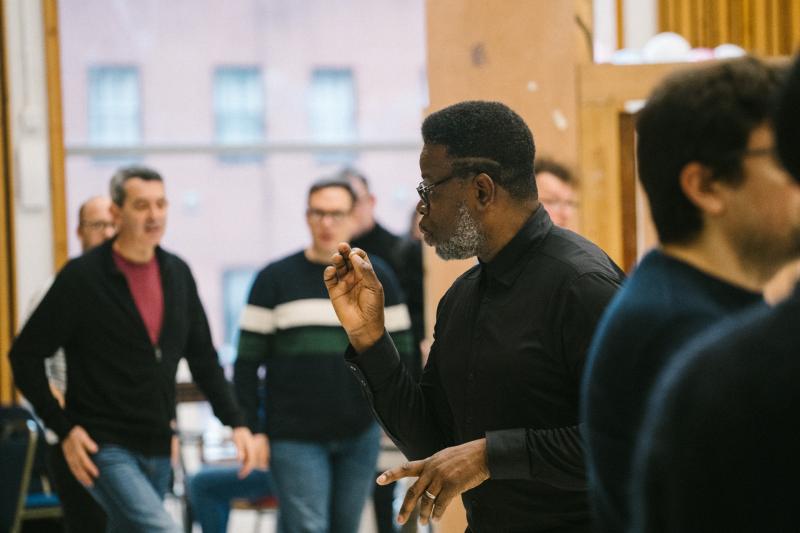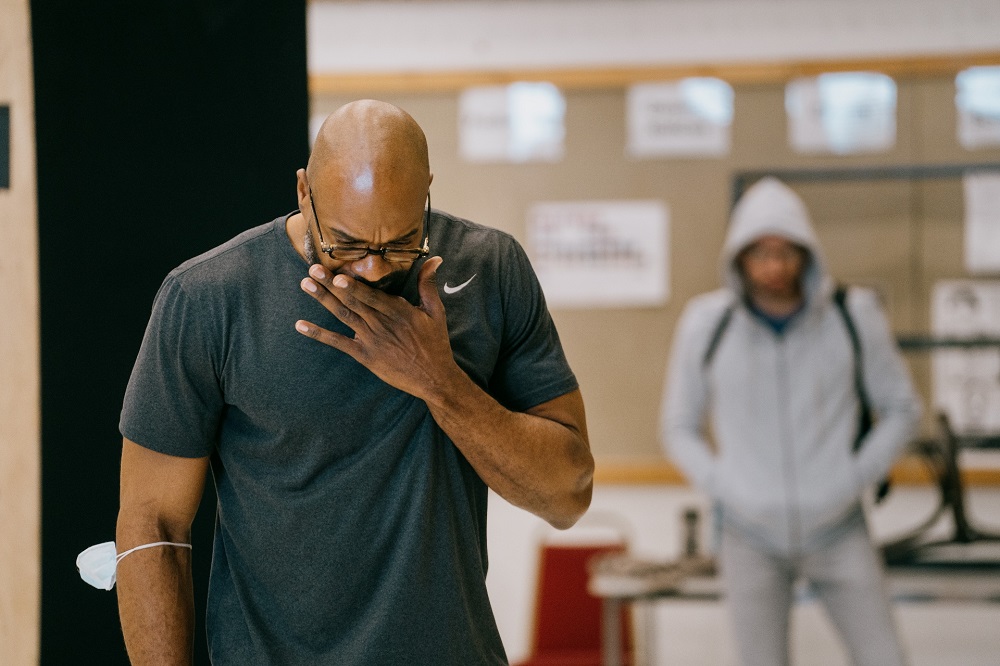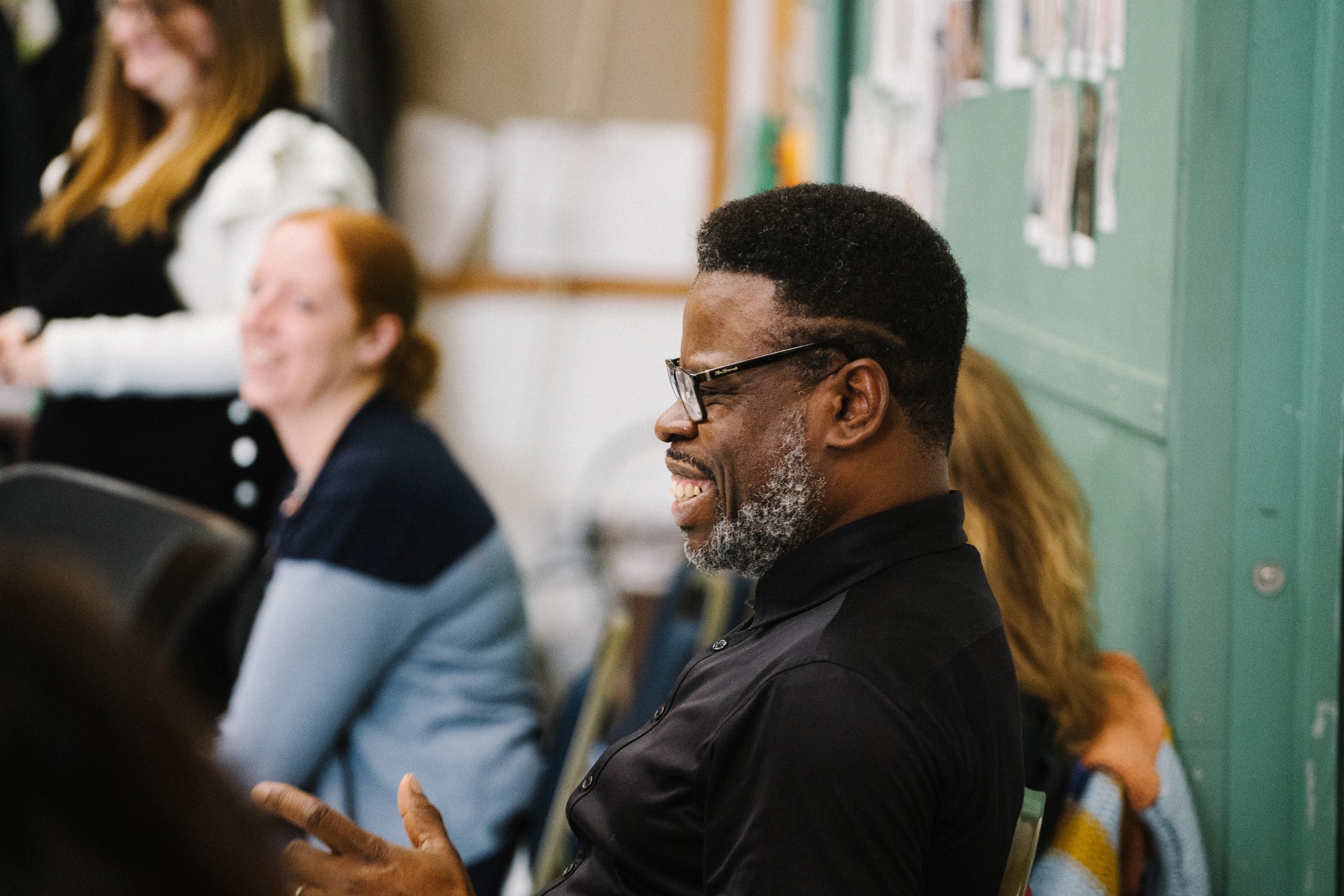First Person: Femi Elufowoju Jr on directing Verdi's 'Rigoletto' | reviews, news & interviews
First Person: Femi Elufowoju Jr. on directing Verdi's 'Rigoletto'
First Person: Femi Elufowoju Jr. on directing Verdi's 'Rigoletto'
A theatre director's take on his first opera as he rehearses in Leeds

I find that my experience of living as a Black man in the UK cannot help but inform the way I approach my work and never more so than with Verdi’s Rigoletto.
This is the first opera I have directed and what a one to begin with. When I looked at the themes explored by Victor Hugo, on whose play Le roi s’amuse the opera is based, Verdi and Piave back in the 19th century, I was struck by their universality and their remarkable relevance today. Who has not been affected by at least one of the following: parental love, spirituality, toxic misogyny, the mindset of power and allegiance, respect, loyalty or – the big one in this opera - revenge? These are the themes we see played out time and again in soap operas on TV, so what I’m really hoping is that people will be encouraged to come and experience them as part of a live performance, in an auditorium, with Verdi’s scintillating music. I’m also keen to ensure that not only the themes but also everything else about this production resonates with a contemporary audience, particularly the visual cultural references – think Netflix and Uber Eats! Of course, the set is key as well. What we will be doing is moving between spaces which feel very familiar to people, such as a basement, a pop-up art gallery, a street alley, a safe house and a disused car park. [Pictured below: Eric Greene as Rigoletto] As I write, we’re taking a long hard look at Act One in the rehearsal room. This, for me, is a crucial act and the one where I’ve chosen to start introducing people’s back stories. The Duchess of Mantua, for example, will be there, in the flesh, so that you instantly understand the audacity, arrogance and impact of her husband’s behaviour, as he proceeds to seduce five women in 24 hours in broad daylight - and gets away with it. Another case in point is Sparafucile, the assassin, who traditionally walks on in Scene Two, knowing everything about Rigoletto - or indeed his sister, Maddalena, who suddenly appears in Act Three. My aim is to establish all the characters from the off so there is no confusion around why things are as they are or why people react as they do. This felt very important to me and will be, I believe, be one of the hallmarks of the production.
As I write, we’re taking a long hard look at Act One in the rehearsal room. This, for me, is a crucial act and the one where I’ve chosen to start introducing people’s back stories. The Duchess of Mantua, for example, will be there, in the flesh, so that you instantly understand the audacity, arrogance and impact of her husband’s behaviour, as he proceeds to seduce five women in 24 hours in broad daylight - and gets away with it. Another case in point is Sparafucile, the assassin, who traditionally walks on in Scene Two, knowing everything about Rigoletto - or indeed his sister, Maddalena, who suddenly appears in Act Three. My aim is to establish all the characters from the off so there is no confusion around why things are as they are or why people react as they do. This felt very important to me and will be, I believe, be one of the hallmarks of the production.
My own back story has also been integral to my approach. For example, something which really resonated with me was the curse. Sometimes it can feel when you’re watching this opera, that the curse only really affects Rigoletto. This did not ring true to me, as a person of Nigerian origina. Although I was born and bred in the UK, I lived in Nigeria from the age of 12 years old and so was able to experience the strength of people’s beliefs and superstitions there at first hand. In my cultural background, a curse, particularly when it’s delivered by an older, wiser person, is a huge thing. Everyone of colour in that room, whether on the stage or in the auditorium, will know the ramifications of the curse, and their reaction will, I think, make everyone else feel affected too. It will be a big moment and the room should definitely shudder.  Moving into the world of opera has been an interesting experience. I’ve worked in theatre for 34 years, but this is very different. I’ve had to listen and listen hard. I have been mentored, I’ve done masterclasses and I’ve been supported by people who have a wealth of experience in this art-form. I feel like I’ve gone back to school but then I’ve also been required to graduate very quickly! I think it’s that combination of my approach as a newcomer to the genre with the expertise of the principals and the Chorus of Opera North that will give this Rigoletto its unique flavour. I hope new people will decide to give opera a go as a result and will realise, like I did, just how relevant it remains to our lives today.
Moving into the world of opera has been an interesting experience. I’ve worked in theatre for 34 years, but this is very different. I’ve had to listen and listen hard. I have been mentored, I’ve done masterclasses and I’ve been supported by people who have a wealth of experience in this art-form. I feel like I’ve gone back to school but then I’ve also been required to graduate very quickly! I think it’s that combination of my approach as a newcomer to the genre with the expertise of the principals and the Chorus of Opera North that will give this Rigoletto its unique flavour. I hope new people will decide to give opera a go as a result and will realise, like I did, just how relevant it remains to our lives today.
Opera North’s new production of Rigoletto opens on Saturday (22 January) at Leeds Grand Theatre before touring to The Lowry at Salford Quays, Nottingham Theatre Royal, Newcastle Theatre Royal and Hull New Theatre
Explore topics
Share this article
The future of Arts Journalism
You can stop theartsdesk.com closing!
We urgently need financing to survive. Our fundraising drive has thus far raised £49,000 but we need to reach £100,000 or we will be forced to close. Please contribute here: https://gofund.me/c3f6033d
And if you can forward this information to anyone who might assist, we’d be grateful.

Subscribe to theartsdesk.com
Thank you for continuing to read our work on theartsdesk.com. For unlimited access to every article in its entirety, including our archive of more than 15,000 pieces, we're asking for £5 per month or £40 per year. We feel it's a very good deal, and hope you do too.
To take a subscription now simply click here.
And if you're looking for that extra gift for a friend or family member, why not treat them to a theartsdesk.com gift subscription?
more Opera
 Giustino, Linbury Theatre review - a stylish account of a slight opera
Gods, mortals and monsters do battle in Handel's charming drama
Giustino, Linbury Theatre review - a stylish account of a slight opera
Gods, mortals and monsters do battle in Handel's charming drama
 Susanna, Opera North review - hybrid staging of a Handel oratorio
Dance and signing complement outstanding singing in a story of virtue rewarded
Susanna, Opera North review - hybrid staging of a Handel oratorio
Dance and signing complement outstanding singing in a story of virtue rewarded
 Ariodante, Opéra Garnier, Paris review - a blast of Baroque beauty
A near-perfect night at the opera
Ariodante, Opéra Garnier, Paris review - a blast of Baroque beauty
A near-perfect night at the opera
 Cinderella/La Cenerentola, English National Opera review - the truth behind the tinsel
Appealing performances cut through hyperactive stagecraft
Cinderella/La Cenerentola, English National Opera review - the truth behind the tinsel
Appealing performances cut through hyperactive stagecraft
 Tosca, Royal Opera review - Ailyn Pérez steps in as the most vivid of divas
Jakub Hrůša’s multicoloured Puccini last night found a soprano to match
Tosca, Royal Opera review - Ailyn Pérez steps in as the most vivid of divas
Jakub Hrůša’s multicoloured Puccini last night found a soprano to match
 Tosca, Welsh National Opera review - a great company reduced to brilliance
The old warhorse made special by the basics
Tosca, Welsh National Opera review - a great company reduced to brilliance
The old warhorse made special by the basics
 BBC Proms: The Marriage of Figaro, Glyndebourne Festival review - merriment and menace
Strong Proms transfer for a robust and affecting show
BBC Proms: The Marriage of Figaro, Glyndebourne Festival review - merriment and menace
Strong Proms transfer for a robust and affecting show
 BBC Proms: Suor Angelica, LSO, Pappano review - earthly passion, heavenly grief
A Sister to remember blesses Puccini's convent tragedy
BBC Proms: Suor Angelica, LSO, Pappano review - earthly passion, heavenly grief
A Sister to remember blesses Puccini's convent tragedy
 Orpheus and Eurydice, Opera Queensland/SCO, Edinburgh International Festival 2025 review - dazzling, but distracting
Eye-popping acrobatics don’t always assist in Gluck’s quest for operatic truth
Orpheus and Eurydice, Opera Queensland/SCO, Edinburgh International Festival 2025 review - dazzling, but distracting
Eye-popping acrobatics don’t always assist in Gluck’s quest for operatic truth
 MARS, Irish National Opera review - silly space oddity with fun stretches
Cast, orchestra and production give Jennifer Walshe’s bold collage their all
MARS, Irish National Opera review - silly space oddity with fun stretches
Cast, orchestra and production give Jennifer Walshe’s bold collage their all
 Káťa Kabanová, Glyndebourne review - emotional concentration in a salle modulable
Janáček superbly done through or in spite of the symbolism
Káťa Kabanová, Glyndebourne review - emotional concentration in a salle modulable
Janáček superbly done through or in spite of the symbolism
 Buxton International Festival 2025 review - a lavish offering of smaller-scale work
Allison Cook stands out in a fascinating integrated double bill of Bernstein and Poulenc
Buxton International Festival 2025 review - a lavish offering of smaller-scale work
Allison Cook stands out in a fascinating integrated double bill of Bernstein and Poulenc

Add comment